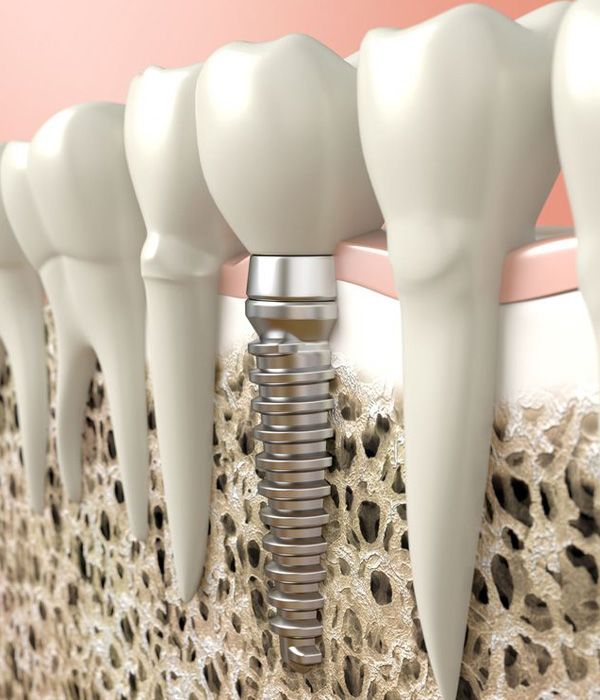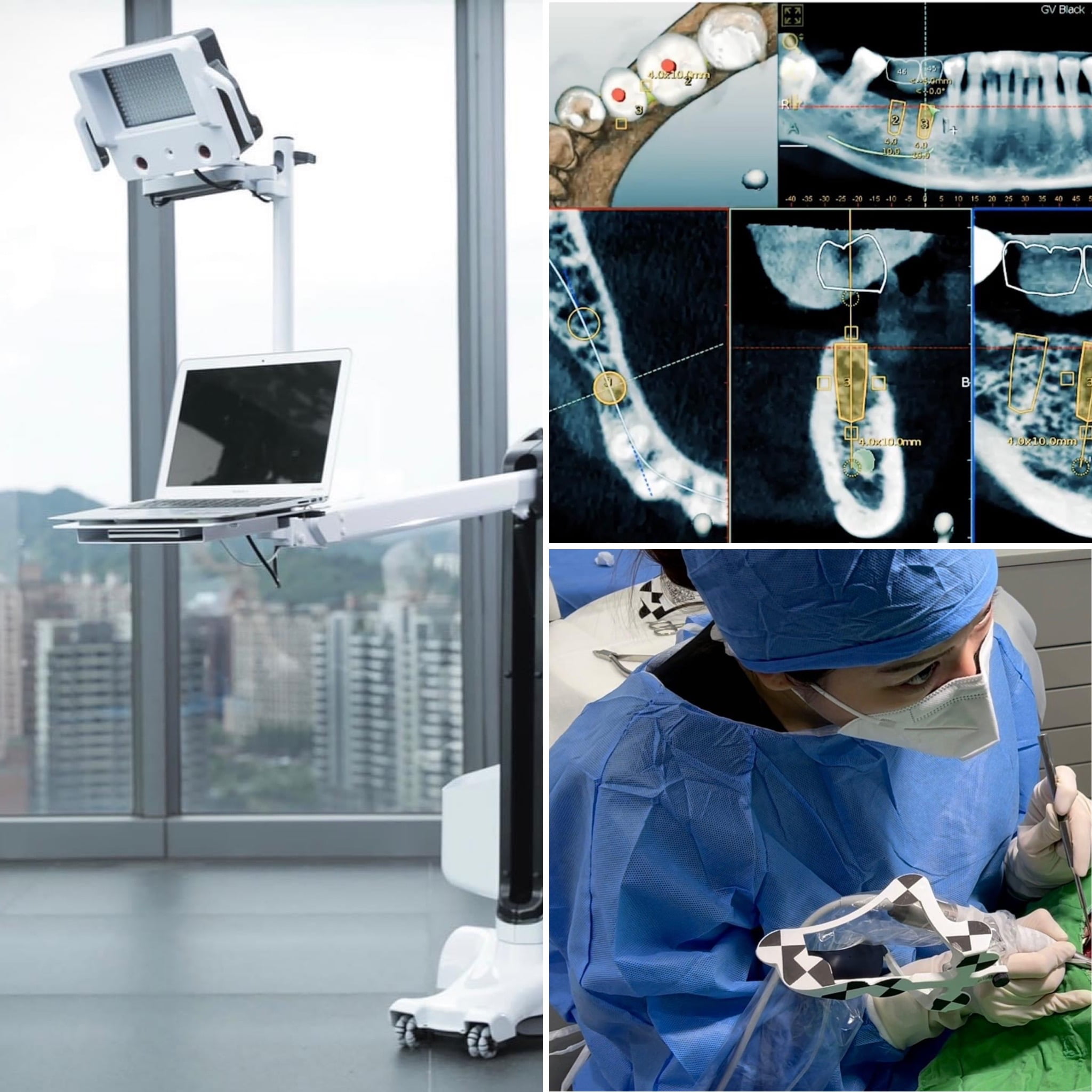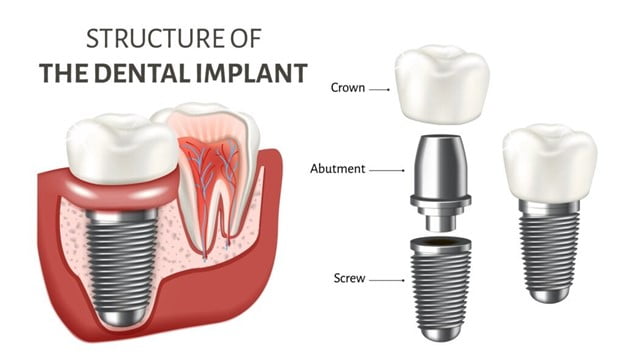DENTAL IMPLANT
THE RIGHT CHOICE
Dental implants are a high-success rate, long-lasting treatment option for the restoration and replacement of missing teeth. Dental implants are essentially titanium posts that mimic tooth roots in the jaw bone. Once in place, they osseointegrate with your natural bone (meaning your jaw bone will attach itself and bond onto the implant to fully support it). Replacement teeth can then be attached onto the implant to offer a functional and aesthetic restorative result.

BENEFITS OF DENTAL IMPLANTS

Strong, stable, and functional like natural teeth. Dental implants have the highest success rate of all tooth replacement options.

Encourage the growth of healthy bone and gum tissue.

Can last 30+ years (twice as long as other restorations, like bridges and dentures).

No removing dentures or limiting your food choices. Easy to care for — just brush, floss, and visit your dental office as normal.
ARE DENTAL IMPLANTS RIGHT FOR YOU?
If you’re considering tooth replacement options, dental implants may be the perfect solution. Here are some key points to consider:
- Ideal for one or more missing teeth
- Permanent solution offering stability, durability, and improved comfort
- Require good oral health and a strong jawbone for successful placement
- Multi-stage procedure
- Proper care is essential for long-lasting results
- A reliable option for restoring your smile and oral health

Innovation
WHY WE ARE UNIQUE?
For dental implant surgeries, our clinic uses a 3D dynamic navigation technology system called “Navident” which provides real-time precision guidance for increased accuracy for dental implant surgeries. “Navident” is one of the most advanced, state-of-the-art technology available today for precise placement of dental implants. Precision is x11 times more accurate than free-hand surgery. This technology has also been backed up with 15 years of research and development and clinical practice – which has paved the road to proven accuracy and clinical results.

INTERVIEW
Dental Implant Interview with Dr. Woo
How Much do Dental Implants Cost?
The average cost of dental implants in Taiwan costs around NTD $80,000-$120,000. However price varies depending on the complexity of each specific case.
- Uncomplicated single dental implant: $80,000-120,000
- Complex single dental implant (+bone graft, sinus lift): $100,000-140,000
- Full mouth ‘All-on-4’ dental implant procedure: $1,000,000-1,500,000
**Complications such as a weak, thin, or shallow bone structure requiring bone grafting may increase the listed prices. The only way to determine this is by having booking a consultation with our dental team.
At first glance, dental implants may appear expensive, however, this treatment option actually lasts the longest out of all tooth replacement options – making it the most cost-effective and reliable solution.
How long does it take to replace teeth using dental implants?
The dental implant procedure is basically a three-phase process, which can differ for each person. Typically the entire process takes from 5 to 9 months from start to finish.
What if I don't do anything about my Missing Teeth?
Sometimes, adults can lose their teeth due to gum disease, cavities, tooth decay, infection, or accidents. Missing a tooth without replacement, overtime, can cause a domino effect of damage and devastating issues to your whole oral environment.
Here are 5 things that happens to you when you don’t replace missing teeth with dental implants:
- Shifted teeth: Just like trees naturally grow toward sunlight, teeth naturally shift towards empty space. When you lose a tooth and have an empty space, the neighbouring tooth, over time, will collapse and drift into the empty space.
- Elongation or over-eruption of the opposing tooth into the space: Normally, our upper and lower teeth come together in a harmonious bite. When you lose a tooth, the opposing tooth (upper/lower) will drift and grow too long into the empty space.
- Crooked teeth and appearance: Because your teeth have shifted or grew longer than they were supposed to, your smile and bite will end up looking misaligned and crooked.
- Biting and chewing functions: A normal bite involves properly aligned teeth coming together harmoniously when you eat or chew. When you have missing teeth, more stress is now loaded onto the other adjacent or neighbouring teeth which becomes exhausting. Your chewing and food-grinding efficiency also decreases because of missing teeth. This will affect your digestion in the long run, as chewing is the first step in our digestive process. You might now find yourself avoiding firm, chewy or crunchy foods because they are difficult to chew.
- Loss of bone structure and loss of face, cheek and lip support: When you pull out a tooth, bone resorption and loss of bone mass occurs. In just the first year of tooth loss, there is 25% decrease in bone width. When the bone mass thins down and gradually collapse, it pulls the attached muscles and tissues with it. This can gradually change your facial structure because your facial muscles are connected to strategic points of your bone structure. Overtime, these changes together will cause your face to look lopsided.
Living with missing teeth can degrade your overall health. The longer you wait to address a missing back tooth, the worse the consequences become and also the more costly they may get.
How long do dental implants last?
With proper care recommendations and maintenance, dental implants can last for a lifetime. No other tooth replacement option has the ability to last that long.
(e.g. dentures or a dental bridge which require replacing every 5-7 years.)
How to maintain implant teeth?
Dental implants should be cared for like natural teeth – requiring regular cleanings, dental checkups, and careful home care to prolong their lifespan. Brushing lightly with a soft nylon brush and flossing daily around your dental implants can prevent infections from occurring. Your dentist may recommend using an interdental toothbrush or floss to clean hard-to-reach areas around your teeth, gums, and implants.
Getting professional dental cleanings can help remove bacteria from below the gum line and prevent infection and ensure the long-term stability and function of your implant.
How is the quality of dental implants in Taiwan? What are key points to look for?
For dental implant surgeries, our clinic uses a 3D dynamic navigation technology system called “Navident” which provides real-time precision guidance for increased accuracy for dental implant surgeries. “Navident” is one of the most advanced, state-of-the-art technology available today for precise placement of dental impalnts. Precision is x11 times more accurate than free-hand surgery. This technology has also been backed up with 15 years of research and development and clinical practice – which has paved the road to proven accuracy and clinical results.
Key points to look for when choosing your dental implant treatment plans are selection of an experienced clinician, and reputable reliable dental implant brands to be implanted into your jaw (e.g. Nobel biocare, Astra, Straumann, BEGO etc.)
Dr.Woo using Navident technology in the middle of dental implant surgery.

What Materials Are Dental Implants Made Of?
A dental implant consists of three parts – the dental implant post, the abutment, and the porcelain crown or artificial tooth. Dental implants are small titanium screws that fuse directly in your jawbone, while the abutment acts as a connector between the implant and the artificial tooth.
Two main materials are used for implant posts: titanium and zirconium.
- Titanium is a material used since 1981 because of its high strength, light weight, durability, corrosion resistance, and biocompatibility (meaning it integrates well with the surrounding bone and gum tissue).
- Zirconia is a more recent discovery for dental implants and has proven to hold alot promise. This material is used for people who have a metal allergy and cannot use titanium. Zirconia could also help make the surgical process abit easier to due to its one-piece construction compared to the three pieces of titanium. However, they can be harder to insert, and more expensive compared to titanium implants.

Are implants better than bridges?
If financial budget and time isn’t a concern – implants are definitely the better option than bridges. Dental implants offer many long-term health benefits over bridges, including prevention of further tooth loss, preventing jaw deterioration, improving your speech, less chance of secondary decay, better oral hygiene, and retaining more of your natural teeth.
How painful is getting a tooth implant?
The surgical procedure itself is painless, because you will be adequately numbed. Most patients report little or no discomfort following their dental implant procedure. However if your dental implant was a more complicated surgery (involving multiple implants, bone graft and sinus lift) – you may expect mild tenderness and swelling after the surgery. But it is something that can be easily soothed and controlled with pain killers.
Hours of Operation
MON – FRI
9:00am – 6:00pm
SAT
9:00am – 12:00pm
Drop Us a Line
Don't be shy. Let us know if you have any questions!
